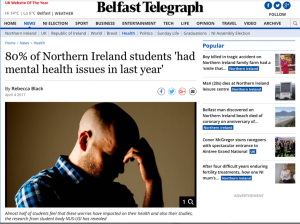
This article is fundamentally flawed on a number of counts. Firstly, the headline is grossly misleading as, where it states ‘mental health issues’, the findings actually found that the students had mental health ‘worries’ instead. This is important as the headline leads us to believe that 80% of students definitevley had medically diagnosed mental health problems. Whereas, in reality, the survey asked questions about how stressed students were about money and their course, for example, and labelled those that said they were stressed about such things as having ‘mental health issues,’ clearly far from the development of serious, medically diagnosed mental illnesses. Thus, in that sense, the article is misleading.
The article is further undermined by the poor methodology used by the researchers, NUS-USI. They interviewed 3,600 students, less than 2% of their sample population of 200,000. Therefore, the margin of error in their findings will be significant. This is further compounded by the fact that their total population of 200,000 students – i.e. those represented by NUS-USI – actually accounts for under half of the entire number of students in Northern Ireland. That is to say that the researchers made claims about a population of over 415,000 having interviewed less than 1% of said population. Therefore, it cannot be said with any confidence whatsoever that the figure of 80% is either accurate or representative of all students in Northern Ireland.
Also, the 80% figure quoted in the headline is actually rounded up from the true figure of 78% found in the study. While rounding up by 2% doesn’t seem significant, it accounts for over 4,000 students, thus they have hyperbolised the findings to make the article more dramatic. It is significantly poor practice as they are claiming 4,000 students have mental health issues that, in reality, do not.
